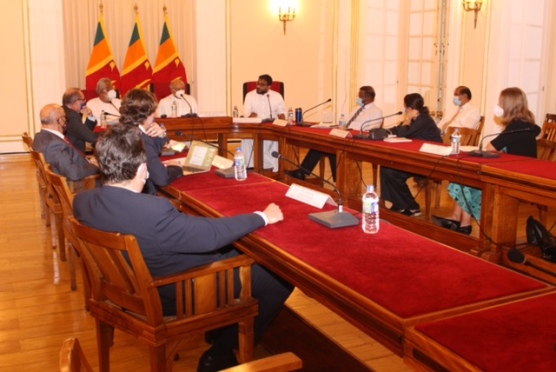COLOMBO – Sri Lanka on Monday (14) rejected claims that the Prevention of Terrorism Act (PTA) has been systematically used for arbitrary arrests and the detention of Muslim and other minority groups, and expressed regret over the European Parliament resolution on the country that put the GSP+ concessions in peril.
Foreign Minister Dinesh Gunawardena, who on Monday convened a meeting with the Chargé d’Affaires of the Delegation of the European Union in Colombo Thorsten Bargfrede, and Colombo-based EU Ambassadors / Chargé d’Affaires from France, Italy, Romania, Germany and the Netherlands, to brief them on the government’s position on the resolution, deemed it contained factual inaccuracies and does not take cognizance of the “multifaceted progress made by Sri Lanka in reconciliation and development”.
The European Parliament on Thursday (10) adopted a resolution titled ‘The Situation in Sri Lanka, in particular the arrests under the Prevention of Terrorism Act’ that put the country’s trade concessions for imports to the European Union in grave peril. Adopted by 628 votes in favour in the 705-member legislative assembly of the regional grouping, the EU Parliament called on the EU Commission to consider “temporary withdrawal” of Sri Lanka’s preferential access to European markets, which cuts trade tariffs significantly for Sri Lankan exports, including apparel, ceramic and rubber.
The foreign ministry, in a statement on its response to the resolution, noted that provisions of the PTA had been invoked to address heinous acts of terrorism committed on its people and recalled the Easter Sunday terrorist attacks of 2019, which resulted in significant loss of life, including of several EU nationals. However, it claimed the government was in the process of revisiting provisions of the Act, in keeping with its commitments, as has been communicated to the EU.
“Towards this endeavour, the government is studying existing legislation to propose necessary amendments, and will also draw on international best practices adopted by other jurisdictions. The Government rejects the claim that the PTA has been systematically used for arbitrary arrests and the detention of Muslim or other minority groups in Sri Lanka,” the ministry said.
It also observed that the 20th Amendment had been enacted in full compliance with the procedure set out in the Constitution with a two-thirds majority of the Members of Parliament voting in its favour. “With regard to such legislation, a number of in-built safeguards relating to transparency and judicial review aimed at preventing the passage of bills that are inconsistent with the Constitution, including its Fundamental Rights chapter, have been adhered to,” the ministry pointed out, adding that the government has regularly updated the Human Rights Council as well as EU interlocutors on the measures undertaken to address issues of accountability and to achieve continued progress in reconciliation.
“Mechanisms in place in this regard include the Presidential Commission of Inquiry headed by a Justice of the Supreme Court; the Office of Missing Persons; the Office of Reparations, the Office of National Unity and Reconciliation; the Human Rights Commission of Sri Lanka; and related institutional reforms aimed at non-recurrence and other confidence-building measures,” it noted.
The ministry also pointed out that the Government of Sri Lanka maintains a regular, vibrant and cordial dialogue with the European Union (EU), covering all aspects of bilateral relations, elaborating that the engagement was sustained through the close and cordial dialogue maintained with the European Commission, the Council and the Parliament by the Sri Lanka Mission in Brussels; and with the EU delegation and EU Ambassadors in Colombo by senior interlocutors of Government.
“As part of this process, Sri Lanka has constructive engagement with the European Commission on the review of its EU GSP + compliance with the 27 core International Conventions,” the ministry said, adding, “Towards this end, the Third Cycle of Review of the EU GSP + Monitoring Process for 2020-2021 is ongoing.”
The ministry also noted that Sri Lanka apprised the EU on progress with regard to its wide range of cooperation at the annual EU-Sri Lanka Joint Commission, the 23rd session of which was convened in January 2021. Further updates are provided through the relevant Working Groups and Committees functioning under the purview of the Joint Commission, it added.
Referring to the salient points in the resolution, the ministry submitted that the government has, in accordance with its constitutional mandate and international obligations, taken steps to protect the rights of all its citizens. “Specific provision in terms of Article 12 (1) of Sri Lanka’s Constitution ensures that all persons are equal before the law and are entitled to the equal protection of the law. Article 12 (2) of the Constitution prohibits discrimination based on race, religion, language, caste, sex, political opinion, place of birth or any such grounds,” it explained.
Noting that Sri Lanka’s labour rights, including health and safety conditions, are in compliance with ILO standards, and that Sri Lanka’s high labour standards maintained in production, have led to better quality products, and high value-added exports, the foreign ministry noted the EU GSP + concessions have contributed significantly towards this process, thus benefiting the Sri Lankan economy, as well as the EU market.
Acknowledging that Sri Lanka continues to face challenges brought on by the novel coronavirus pandemic in spite of consistent and concerted efforts by the government to safeguard its entire population and provide equitable access to vaccines, the ministry said in these critical times the country should be supported in safeguarding the rights of its people while taking cognizance of demonstrated progress on the ground. It said the Government of Sri Lanka looks forward to continuing its partnership with the EU on a broad range of issues and reassured the EU of its continued commitment to engage proactively and productively on areas of mutual interest.
-ENCL


